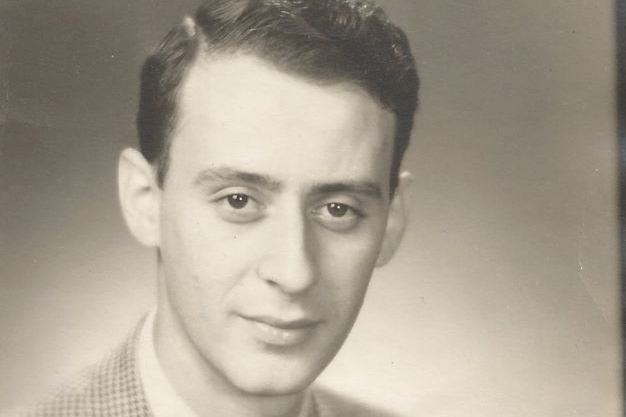The anti-semitic prejudice Arthur Berney experienced as a boy growing up in a multi-ethnic New Jersey neighborhood fueled a long career dedicated to righting injustice and championing the underdog. “His time here made us a better place,” wrote Dean Vincent Rougeau in a message informing the Boston College Law School community of Berney’s passing on April 1, just four months shy of his ninetieth birthday.
Berney “always spoke truth to power,” says friend and BC Law Professor Kent Greenfield. In the summer of 1953, this trait drew the notice of twenty-four-year-old Alice Menkes, when Berney was the only employee with the courage to challenge dangerous management practices at the Adirondacks resort where they both worked as seasonal waitstaff. Berney married Alice, a Viennese-born survivor of the Holocaust, in New York City in January 1954, and the couple had two sons, Lawrence and Ronald. Their sixty-one year marriage ended with Alice’s death in 2015. BC Law Professor Francine Sherman ’80 remembers Berney’s “tremendous love and devotion to his family.”
During his tenure at the Law School, 1964 to 2001, as a teacher of constitutional, communications, and national security law, “Arthur was a beacon of justice and social responsibility” who became “the conscience of the school,” says BC Law Professor Robert M. Bloom ’71. Berney’s first book, Legal Problems of the Poor, 1976, was a “trailblazing effort” that helped establish the field of poverty law, recalls BC Law Professor George Brown. Brown also views Berney as a pioneer in national security law, in which he co-authored one of the first casebooks.
As a civil rights litigator, Berney made his mark as a junior but influential member of the team representing the Loving family in the landmark 1967 case Loving v Virginia that resulted in the striking down of laws banning interracial marriage. Greenfield notes that decades later the due process rationale championed by Berney in Loving provided the basis for the recognition of marriage equality for same-sex couples. When Massachusetts became the first state in the union to recognize same sex marriage following the 2003 Massachusetts Supreme Judicial Court decision in Goodridge v Department of Public Health, Greenfield recalls, Berney was among the leading civil rights activists invited to speak before a celebrating crowd at Faneuil Hall. “Arthur’s brilliance, intellectual innovation, and dedication to justice ended up benefitting literally millions of Americans,” says Greenfield.
When E.L. Doctorow’s 1971 novel, The Book of Daniel, featured as a major character a “Boston College law professor” modeled closely on Arthur Berney, fact and fiction quickly blurred in Law School folklore. The novel is loosely based on the story of Julius and Ethel Rosenberg, convicted and executed for espionage in 1953, and rumors circulated that Berney had acted as an attorney for the Rosenbergs, or a foster-parent for their orphaned sons. Either would have been absolutely in character, but neither was true.
Berney’s son Ronald puts the record straight. His father and Doctorow formed a lifelong friendship during army basic training in 1953, and their families stayed close for over sixty years. The characters of Robert and Lise Lewin, the foster parents of the fictional counterparts of the Rosenberg children, are indeed based on Arthur and Alice Berney, but as far as Ronald Berney knows, his parents never met the Rosenbergs.
What is certainly true is that Doctorow’s portrait of the hardworking, upright lawyer with a kind smile and a gentle sense of humor is an enduring tribute to his old friend, and a lasting memorial to the man who in the words of Dean Rougeau, will be “fondly remembered for his dedication, brilliance, courage, and honesty.”


